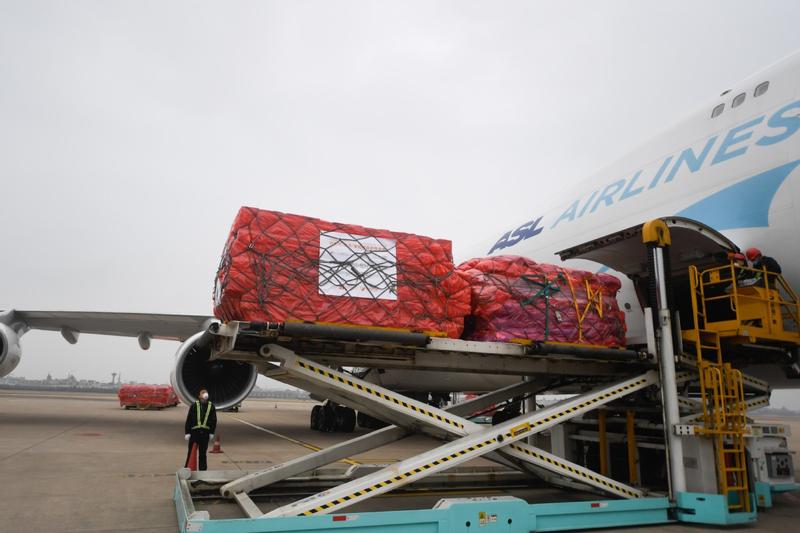 Chinese medical supplies are loaded for shipment to Belgium at Hangzhou International Airport in Zhejiang province in March. (PHOTO / XINHUA)
Chinese medical supplies are loaded for shipment to Belgium at Hangzhou International Airport in Zhejiang province in March. (PHOTO / XINHUA)
BRUSSELS-China's Singles Day, which falls on Nov 11 each year, is the world's biggest 24-hour online shopping event. On that day, visitors to Belgian e-commerce website facealacrise.be were invited to explore a myriad of high-quality products on offer from Chinese retailers.
The COVID-19 pandemic has inarguably changed the world, and the way people shop is no exception.
As countries all over Europe have closed nonessential stores to contain the surge of COVID-19, consumers in increasing numbers have turned to Chinese online shopping websites to purchase the products they want.
The logistics backbone behind the upswing in China's retail sales is air cargo. Companies operate airfreight services along multiple routes between China and the countries of Europe along the "Air Silk Road," an aviation industry initiative inspired by the China-proposed Belt and Road Initiative. The underlying aim is to improve connectivity and foster a sustainable aviation economy.
Liege Airport in southeastern Belgium is the country's largest airport in terms of cargo throughput and is one of Europe's key air cargo hubs. The BRI has greatly boosted the airport's development and business prospects in recent years.
On Oct 27, the Qingdao-Liege all-cargo regular international route was officially opened. It's the latest addition to airfreight services connecting China with Belgium.
ALSO READ: Online shopping habits of women more diversified
The pandemic has forced the suspension of several flights between China and Europe, but "Air Silk Road" cargo companies at Liege Airport continue to operate at almost full capacity, helping countless small and medium-sized enterprises deliver their products across thousands of miles.
Liege Airport expects to be among the few airports in Europe to maintain 10 percent or higher growth rate in 2020. Its annual cargo volume is projected to exceed 1 million metric tons for the first time.
Luc Partoune, CEO of the airport, attributed this to the rapid development of cross-border e-commerce, adding that it benefited not only the aviation industry but also other industries, and not only China but also the world over.
Seizing the business opportunity, Yang Gaijing, an overseas Chinese who has been engaged in the catering industry in Liege for more than 20 years, launched his logistics company this year and wasted no time in participating in the Singles Day shopping bonanza.
"Online shopping has huge potential in Europe, and is unlike China, where the market is saturated. Our company will also focus on helping European SMEs export to China in the future," Yang said.
Meanwhile, new cargo routes connecting Belgium's Ostend-Bruges International Airport with a few Chinese cities-including Shanghai; Shijiazhuang, Hebei province; and Nanchang, Jiangxi province-were Gopened in late September.
The airport's CEO, Marcel Buelens, told Xinhua News Agency at the opening event that he looked forward to closer cooperation between Europe and China and expected his airport to become a hub in this framework.
New routes launched in the past several years have enriched the Air Silk Road, whose role is expanding even further during the ongoing COVID-19 pandemic as countries struggle amid economic fallout.
The Civil Aviation Administration of China said the country has maintained regular international passenger and cargo flights to 45 countries and regions during the pandemic. At present, China and BRI-involved countries and regions operate 1,068 cargo flights per week, 2.6 times more than before the pandemic.
Among the flights shuttling between China and Europe are those on the Zhengzhou-Luxembourg international freight route. It was launched in 2014 after Henan Civil Aviation Development and Investment Co Ltd acquired a 35-percent stake in Luxembourg-based Cargolux Airlines International, which operates the biggest all-cargo airline in Europe.
The airfreight service currently operates up to 23 flights per week connecting Europe, Asia and the United States, with Zhengzhou at its core.
Zhou Lihong, chairwoman of the China Chamber of Commerce to the EU, told Xinhua that airfreight is ideal to guarantee point-to-point trade exchanges.
In contrast to the land and maritime Silk Roads, the Air Silk Road can overcome the infrastructure problems associated with land transportation, as well as the geographical limitations of maritime transportation, Zhou said.
The Air Silk Road has also proved its worth by helping save lives during the pandemic.
On March 16, 300,000 face masks arrived from China at Liege Airport via the Air Silk Road.
This was the first large shipment of personal protective equipment to Belgium since the start of the outbreak. Maggie De Block, former health minister of Belgium, expressed the country's gratitude to China in a statement.
On March 21, approximately 8 tons of medical supplies provided by the Chinese government to Greece arrived at Athens International Airport on an Air China flight. Greek Health Minister Vasilis Kikilias conveyed his country's "deepest and warmest thanks and gratitude" to China at the handover ceremony.
READ MORE: Record online car sales during Singles Day shopping festival
Another batch of medical supplies arrived in Luxembourg one day later via the established Zhengzhou-Luxembourg route.
The Finnish National Emergency Supply Agency also stated that earlier this year, a total of 12 medical cargo flights arrived in Finland from China to help the country fight the virus.
On April 14, a large shipment of medical supplies, including a record 100 tons of medical cargo transported by an Antonov An-225 Mriya, arrived in Poland from China.
Back in Liege, the airport has become an anti-contagion rescue center in recent months. Large volumes of medical supplies coming from China pass through the Liege hub and are transferred to 15 European countries, including Italy and France.
CAAC figures show that China has provided anti-coronavirus assistance to 47 countries and regions since the outbreak of COVID-19, delivering more than 1,700 tons of medical supplies.


